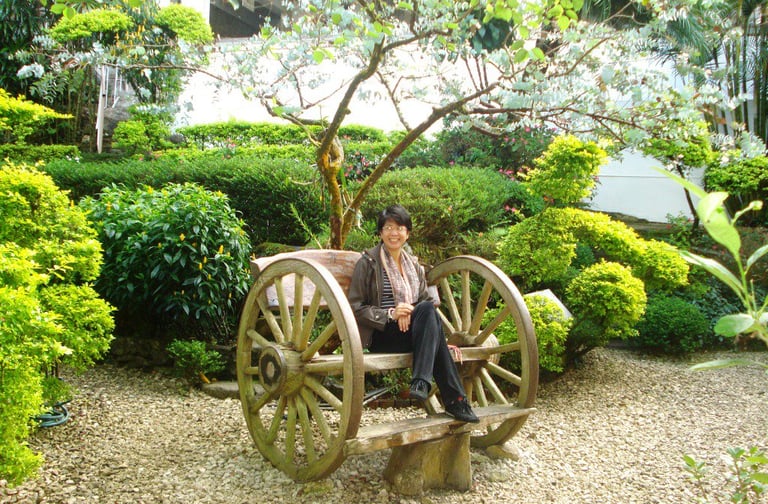Understanding Subjectivity: Faith and Philosophy
BEING AT WORDHOUSE


Have you ever been told you’re being “too subjective” or “too biased” like you’re being unfair or irrational? This ‘accusation’ of being subjective can sound like a warning to a writer. But subjectivity is inevitable, and in fact, the very thing that gives our writing voice an edge.
Philosophers love big words, but we can borrow from them without getting lost in the jargon. Descartes, for example, famously said, “I think, therefore I am.” He believed our thoughts prove we exist—even if our bodies change, the mind’s perspective remains.
Phenomenologists took a different angle. For Maurice Marleau Ponty, it’s not just about how we describe ourselves but how we actually live and act. If someone says they’re outgoing but avoids eye contact at parties, their actions tell the real story. "I act, therefore I am"
And then there’s Sartre, the existentialist. He insisted that while we’re free to choose our paths, we’re also responsible for those choices. That’s another way of saying: your perspective matters, but it also has consequences.


Culture Shapes the Way We See
In collectivist cultures (like our Filipino culture), the group matters most. Identity and dignity come from family and community. In individualist cultures, success and identity are about personal achievement.
History shapes subjectivity too. For example, the legacy of colonialism continues to affect how indigenous communities understand identity and resilience. But this distinction is too clean. Culture is a big word, and honestly, it can feel overwhelming. Sometimes, I even wonder if I’m anti-culture—after all, a lot of Christian literature warns us not to simply absorb everything culture throws at us.
Take common Filipino beliefs like malas (bad luck) or suwerte (good luck). Personally, I don’t believe in either. I believe in blessings, in grace, in God’s hand. But here’s the thing: my Filipino culture still has a way of framing life through those ideas, and I can’t ignore it.
A late writer, Evelyn Miranda-Feliciano, once wrote about “Lusot, Lakad, at Lagay”, three shady political moves that happen far too often in Philippine institutions. On the other hand, we have many prominent social anthropologists discussing pakikipagkapwa-tao, the Filipino deep value of connecting with and caring for others. Put those side by side, and you see a tension in our cultural mindscape.
Subjectivity in Art and Stories
In literature, subjectivity shows up in narrators and characters, their inner thoughts revealed for acceptance or denial. We take note of how our creations become models for thinking and visualizations of ideas. In visual art, subjectivity is expressed through brushstrokes, color choices, and the moods an artist evokes.
Martha Nussbaum reminds us that art grows our empathy. It helps us see life through someone else’s lens. By entering the imagination of another, whether through a novel, a painting, or a piece of music, we are invited to recognize perspectives we might otherwise ignore.
Yet art is never a one-way act. An artist may draw deeply from personal experience, but when that work is shared, it begins a dialogue with a wider world. The personal becomes relational. Viewers and readers bring their subjectivities into the encounter, layering meaning onto what is presented. In this way, art becomes a meeting ground where individuality and community intertwine.
Subjectivity never ends with the artist. It lives on in every reader who lingers over a line, in every viewer who pauses to look, in every listener who hears a note differently than the composer intended. Each new encounter renews the work, proving that art’s subjectivity is not its weakness but its strength.


"The ego is not master in its own house" Sigmund Freud


Faith, the Deep Ground
Filipino writers like Dr. Melba Maggay remind us of the “deep structures” in Filipino life that surface in our art and letters. When we write, we cannot simply put down feelings. Our subjectivity, what we see and feel, will always bump up against our worldview, what we believe and hold true.
For me, without the Word of God, my perspective would be little more than aimless wandering. My subjective stories only find grounding in Him.
Is this a limitation? Not at all. Without this worldview, I would be no more than a parrot repeating noise. With it, my subjectivity becomes not just opinion, but testimony.
As a writer, I often wonder, “But who really cares what I think?” Yet as a Christian, I know that every memory, every feeling, and every cultural encounter is measured against the truth of Christ. As one author put it, “Only what’s done for Christ will last.”
My subjectivity, then, is really about witness. If my writing does not reflect a Christian subjectivity, then something is incongruent. After all, I am a disciple.




